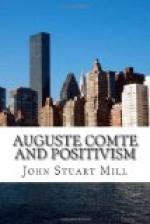calling into active exercise the three social sentiments,
veneration, attachment, and kindness. We are
to regard them, whether dead or alive, as our guardian
angels, “les vrais anges gardiens.”
If the last two have never existed, or if, in the
particular case, any of the three types is too faulty
for the office assigned to it, their place may be
supplied by some other type of womanly excellence,
even by one merely historical. Be the object
living or dead, the adoration (as we understand it)
is to be addressed only to the idea. The prayer
consists of two parts; a commemoration, followed by
an effusion. By a commemoration M. Comte means
an effort of memory and imagination, summoning up
with the utmost possible vividness the image of the
object: and every artifice is exhausted to render
the image as life-like, as close to the reality, as
near an approach to actual hallucination, as is consistent
with sanity. This degree of intensity having
been, as far as practicable, attained, the effusion
follows. Every person should compose his own form
of prayer, which should be repeated not mentally only,
but orally, and may be added to or varied for sufficient
cause, but never arbitrarily. It may be interspersed
with passages from the best poets, when they present
themselves spontaneously, as giving a felicitous expression
to the adorer’s own feeling. These observances
M. Comte practised to the memory of his Clotilde,
and he enjoins them on all true believers. They
are to occupy two hours of every day, divided into
three parts; at rising, in the middle of the working
hours, and in bed at night. The first, which
should be in a kneeling attitude, will commonly be
the longest, and the second the shortest. The
third is to be extended as nearly as possible to the
moment of falling asleep, that its effect may be felt
in disciplining even the dreams.
The public cultus consists of a series of celebrations
or festivals, eighty-four in the year, so arranged
that at least one occurs in every week. They
are devoted to the successive glorification of Humanity
itself; of the various ties, political and domestic,
among mankind; of the successive stages in the past
evolution of our species; and of the several classes
into which M. Comte’s polity divides mankind.
M. Comte’s religion has, moreover, nine Sacraments;
consisting in the solemn consecration, by the priests
of Humanity, with appropriate exhortations, of all
the great transitions in life; the entry into life
itself, and into each of its successive stages:
education, marriage, the choice of a profession, and
so forth. Among these is death, which receives
the name of transformation, and is considered as a
passage from objective existence to subjective—to
living in the memory of our fellow-creatures.
Having no eternity of objective existence to offer,
M. Comte’s religion gives it all he can, by holding
out the hope of subjective immortality—of
existing in the remembrance and in the posthumous




